 To enhance service speed and avoid tariff delays, we've opened a US warehouse. All US orders ship directly from our US facility.
To enhance service speed and avoid tariff delays, we've opened a US warehouse. All US orders ship directly from our US facility.
| Cat. No. | Product Name | Field of Application | Chemical Structure |
|---|---|---|---|
| DC7671 | UNC0379 Featured |
UNC0379 is a selective, substrate-competitive inhibitor of the lysine methyltransferase SETD8 with IC50 of 7.3±1.0 uM; selective over 15 other methyltransferases.
More description
|
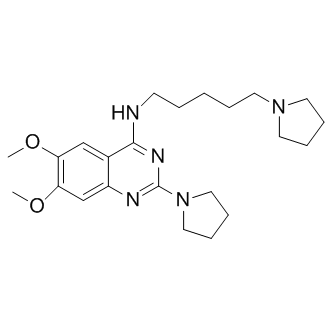
|
| DC7915 | UNC0321 Featured |
UNC0321 is a potent and selective G9a inhibitor with Ki of 63 pM, UNC0321 is the first G9a inhibitor with picomolar potency and the most potent G9a inhibitor to date.IC50 value: 63 pM(Ki); 9 nM (ECSD assay) [1]Target: G9aIt was found that replacing the 5-
More description
|
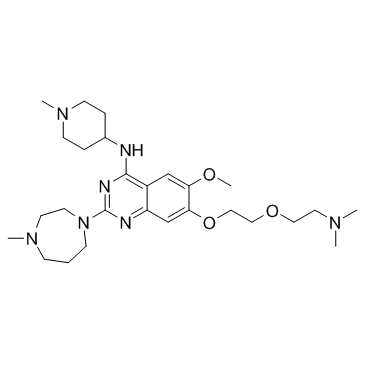
|
| DC7296 | UNC669 Featured |
UNC 669 is a potent antagonist of L3MBTL1(IC50=4.2 uM) and L3MBTL3(IC50=3.1 uM).
More description
|
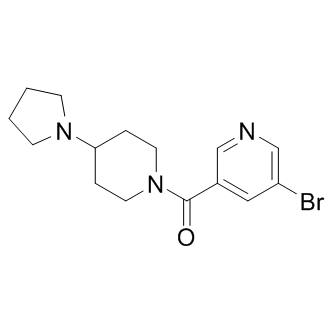
|
| DC7708 | UNBS5162 Featured |
UNBS5162 is a novel naphthalimide that decreases CXCL chemokine expression in experimental prostate cancers; the mean antiproliferative activity IC50 value is 17.9 uM for 9 cancer cell lines; hydrolysis product of UNBS3157.
More description
|

|
| DC7950 | UMI-77 Featured |
UMI-77 is a selective Mcl-1 inhibitor with Ki of 490 nM, showing selectivity over other members of Bcl-2 family.
More description
|

|
| DC12805 | ULK-101 Featured |
ULK-101 is a potent and selective ULK1 inhibitor with in vitro IC50 of 8.3 nM.
More description
|
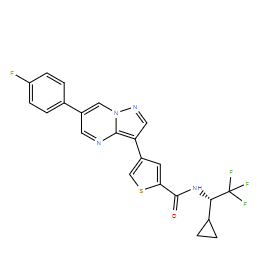
|
| DC7557 | Ulixertinib (BVD-523, VRT752271) Featured |
Ulixertinib, also known as BVD-523 and VRT752271, is an inhibitors of ERK protein kinase.
More description
|
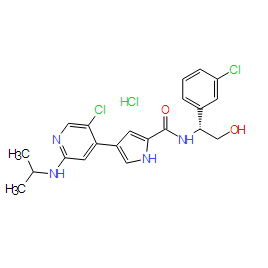
|
| DC1111 | UK-5099 Featured |
UK5099 is an inhibitor of plasma membrane monocarboxylate transporters (MCTs) and the mitochondrial pyruvate carrier (MPC).
More description
|
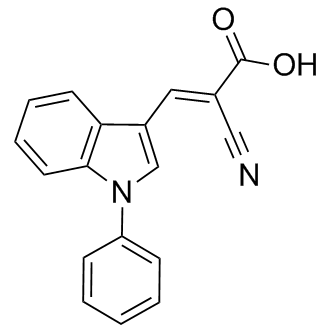
|
| DC8663 | UF010 Featured |
UF010 is a potent and selective HADC inhibitor with IC50 ~0.06 μM, 0.1 μM, 0.5 μM and 1.5 μM for HDACs 3, 2, 1 and 8, respectively. It has > 6-fold selectivity over other HDACs.
More description
|
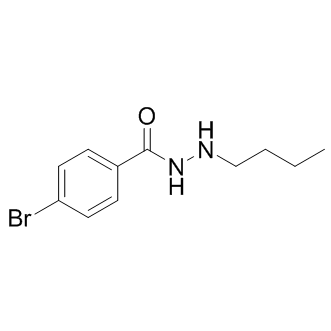
|
| DC10619 | UCPH-101 Featured |
UCPH-101 is a selective excitatory amino acid transporter subtype 1 (EAAT1) inhibitor.
More description
|

|
| DC8272 | U-104 Featured |
U-104 is a potent carbonic anhydrase (CA) inhibitor for CA IX and CA XII with Ki of 45.1 nM and 4.5 nM; low inhibition for CA I and CA II.
More description
|

|
| DC10468 | Tyrphostin AG-555 Featured |
Tyrphostin AG 555 is a potent epidermal growth factor receptor kinase inhibitor.
More description
|
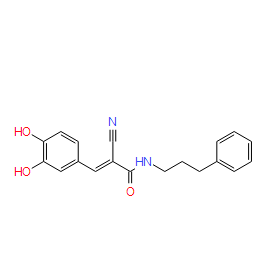
|
| DC5005 | tw-37 Featured |
TW-37 is a novel nonpeptide inhibitor to recombinant Bcl-2, Bcl-xL and Mcl-1 with Ki of 0.29 μM, 1.11 μM and 0.26 μM, respectively.
More description
|

|
| DC20133 | Tulrampator (CX-1632) |
Tulrampator (CX-1632) is an orally bioavailable positive AMPAR (allosteric modulator of AMPA receptor). Antidepressant.
More description
|
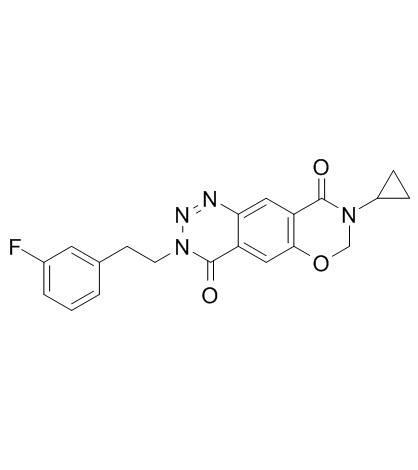
|
| DC7036 | TUG-770 Featured |
TUG-770 is a highly potent free fatty acid receptor 1 (FFA1/GPR40) agonist with EC50 of 6 nM for hFFA1.
More description
|
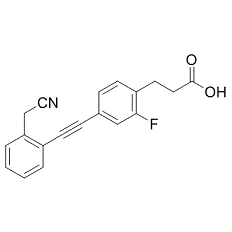
|
| DC6304 | Tubastatin A Featured |
Tubastatin A is a potent and selective HDAC6 inhibitor with IC50 of 15 nM. It is selective against all the other isozymes (1000-fold) except HDAC8 (57-fold).
More description
|
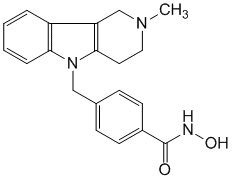
|
| DC5178 | Tubacin (BML-GR362) Featured |
Tubacin is a selective inhibitor of HDAC6 via inhibition of the second deacetylase domain (DD2).
More description
|
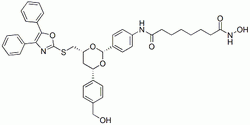
|
| DC7523 | TTP22 Featured |
TTP 22 is a high affinity, ATP-competitive casein kinase 2 (CK2) inhibitor with IC50/Ki of 0.1 uM/40 nM; shows selectivity for CK2 over JNK3, ROCK1, and MET(IC50> 10 uM).
More description
|

|
| DC7886 | TTNPB Featured |
TTNPB (Arotinoid Acid) is a potent RAR agonist, and inhibits binding of [3H]tRA with IC50 of 5.1 nM, 4.5 nM, and 9.3 nM for human RARα, β, and γ, respectively.
More description
|
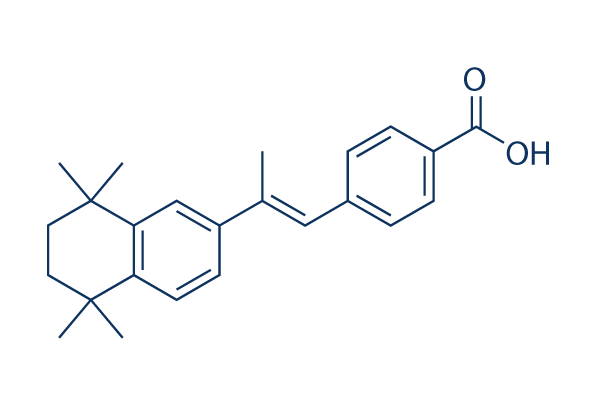
|
| DC7755 | TRCP6 inhibitor(SAR7334) Featured |
TRPC6 inhibitor is a potent TRPC6(Transient receptor potential cation channel, subfamily C, member 6) inhibitor.
More description
|

|
| DC10737 | Tropifexor (LJN452) Featured |
Tropifexor (LJN452) is a highly potent non-bile Acid FXR Agonist for the Treatment of Cholestatic Liver Diseases and Nonalcoholic Steatohepatitis (NASH).
More description
|

|
| DC12037 | Triptolide Featured |
Triptolide is the major bioactive constituent of T. wilfordii Hook F., also known as thunder god vine, a traditional Chinese medicinal herb with known antiproliferative, immunosuppressive, anti-inflammatory, antifertility, and anti-polycystic kidney disea
More description
|

|
| DC8134 | Trichostatin A (TSA) Featured |
Trichostatin A (TSA) is a selective and potent HDAC inhibitor with IC50 of ~1.8 nM; HDAC8 is the only known member of the HDAC-family that is not affected by TSA.
More description
|
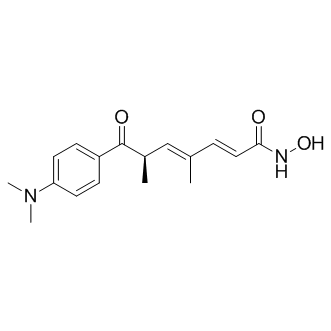
|
| DC7522 | Triapine Featured |
Triapine is a potent ribonucleotide reductase inhibitor with broad spectrum antitumor activity by inhibiting DNA synthesis. Phase 2.
More description
|
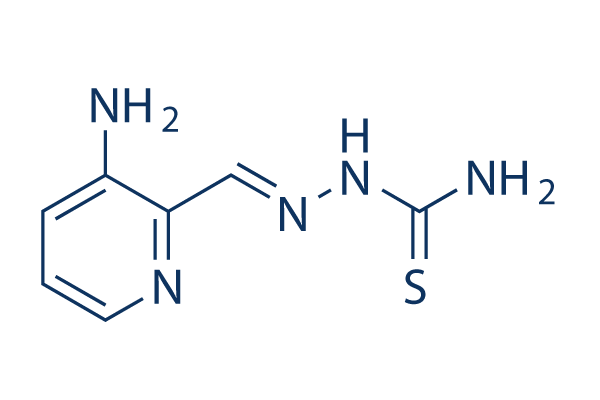
|
| DC9003 | Triamterene Featured |
Triamterene blocks epithelial Na+ channel (ENaC) in a voltage-dependent manner, which used as a mild diuretic.
More description
|

|
| DC12366 | Treprostinil free acid Featured |
Treprostinil is a potent DP1 and EP2 agonist with EC50 values of 0.6±0.1 and 6.2±1.2 nM, respectively.
More description
|

|
| DC24188 | Trenbolone acetate |
Trenbolone acetate (RU-1697,17beta-TBOH) is a potent testosterone analog and selective androgen receptor modulator, is an androgen ester and a long-acting prodrug of trenbolone.
More description
|

|
| DC8710 | Tranylcypromine HCl Featured |
Tranylcypromine HCl is an inhibitor of monoamine oxidase (MAO) and prostacyclin synthase, potently suppresses the enzymatic activity of Lysine-Specific Demethylase 1 (LSD1) (IC50 <2 μM for BHC110/LSD1).
More description
|
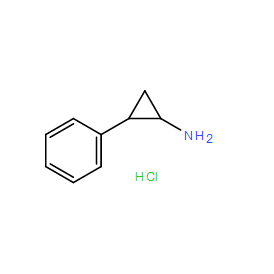
|
| DC6400 | Tranilast (SB 252218) Featured |
Tranilast (SB 252218)
More description
|

|
| DC1099 | Trametinib Featured |
Trametinib is a highly specific and potent MEK1 and MEK2 inhibitor with IC50 of 0.92 nM and 1.8 nM, respectively.
More description
|

|